Canada has participated in the Olympics in ice hockey 20 times since 1920, with their best results being gold medals eight times, most recently at the last Olympics held on home ice in Vancouver in 2010. Canada won the first Olympic gold in 1920 and proceeded to dominate the early events, winning gold in 1924, 1928, 1932, 1948 and 1952. After a 50 year gap, the returned to their winning ways in 2002 and again in 2010. They have also won silver on four occasions, 1936, 1960, 1992 and 1994. A pair of bronze medals rounds out their tally, having been won in 1956 and 1968. Canada withdrew from Olympic competition in a dispute over the rules for amateur players and did not compete in the Olympics in 1972 and 1976.
The Winnipeg Falcons represented Canada in 1920,
bringing the nation it's first gold medal in Olympic hockey
Canada are regular participants in the World Championships, having first participated in 1920, where they won the gold medal, the first of 11 they would win up through 1939 out of 13 possible. Following World War II, the Canadians would pick up where they left off with eight more golds between 1948 and 1961. Each of the 26 times they would participate in the World Championships from 1920 to 1962 they would capture a medal of some sort, with 19 gold, four silver and a bronze.
Three consecutive fourth place finishes from 1963 to 1965 would end the streak as the Canadian program would enter a doldrums. From 1963 to 1993, which included their withdrawl from international hockey from 1970 to 1976, Canada would earn seven bronze and three silver medals, as well as 11 placings outside the medals and no golds.
1994 to 1997 would see a return to the top, with gold in 1994 and 1997, silver in 1996 and bronze in 1995. A five year medal absence from 1998 to 2002 would be forgotten with back to back golds in 2003 and 2004 and silver in 2005. A fourth place in 2006 was followed by another gold in 2007, the 18th gold in their history, and silver in 2008 and 2009. Since that time, they have not played for a medal, managing no better than 5th place for the last three consecutive years following a disappointing 7th in 2010, their lowest finish since 1992.
Canada's last World Championship gold came in 2007
As one of the hockey world's top teams, Canada have also hosted the six team Canada Cup five times, winning four, and the eight team World Cup of Hockey twice, winning the championship in 2002.
Canada enters the 2014 Olympics with all 25 players on it's roster from the NHL. It's popular to say that Canada is strong enough and deep enough that they could field two teams in the Olympics.
Much of the success Canada can attain will depend on the goaltending of Roberto Luongo. of Vancouver, the gold medal winning goaltender for Canada in 2010, and his partner Carey Price of Montreal. The defense is solid but much younger than in 2010 and lacking in the dominant names of the past.
The Canadian forwards are a stellar collection of talent that should carry this team far into the playoffs, highlighted by captain Sidney Crosby, Corey Perry, Jonathan Toews, Ryan Getzlaf, Patrick Shar, John Tavares. and perhaps Steven Stamkos, should he recover from his recent injury in time. About the only thing that looks to be capable of sidelining the Canadians is pressure from the home media and fans, as the talent is beyond reproach and as deep as any team in the tournament.
Jonathan Toews thrilled the home fans with
a goal during the gold medal final in 2010
With the format for this year's Olympics calling for the top four teams after the Preliminary Round to receive byes into the quarterfinals, the key for Canada will be defeating Finland in their game on February 16th to earn an extra day of rest with a bye into the Quarterfinals by winning Group B. Canada must also avoid a repeat of their upset 2-0 loss to Switzerland in 2006, but we do not see that happening with the likes of Norway and Austria this time out.
Canada will likely earn one of the four byes and draw one of the lower ranked teams remaining in the Quarterfinals. The challenge for Canada looks as if it will really begin with the semi-finals and dealing with the increasing pressure as the tournament progresses and expectations rise, but with several players on the team having captured Stanley Cups and loads of veteran leadership (six members of the Canadian roster are captains of their NHL teams), expect the Canadians to deal with the pressure and reach the semifinals at the very least, which will have them playing for a medal in Sochi.
Today's featured jersey is a 1977 Canada National Team Phil Esposito jersey as worn during the 1977 World Championships, which was Canada's return to the world stage, as Canada had withdrawn from international participation in 1970 over a dispute over the rules governing amateur players, a surprising decision in light of Canada having been scheduled to host the World Championships for the first time.
At the core of the dispute was the fact the Eastern Bloc countries, mainly the Soviet Union and Czechoslovakia, were able to have their older, full time NHL-caliber players classified as amateurs due to technically being considered non-professionals under their communist system, which most often listed their profession as that of a solider, whose military assignment was to play hockey.
As a result of the dispute, Canada declined to host the 1970 World Championships as scheduled, nor participate in the World Championships from 1970 through 1976. Canada also declined to compete at the Olympic hockey tournament in both 1972 and 1976 until an agreement was finally reached to allow professional players to compete in IIHF competitions and the annual World Championships were moved to later into the spring, which allowed NHL players no longer involved in the Stanley Cup playoffs an opportunity to compete for their country.
When Canada did return to the World Championships in 1977, it was with one of the most garish jerseys in their history, a garish four color maple leaf crest, which looks not unlike an explosion in progress! Another unusual aspect of their jerseys was the use of contrasting nameplates of white with red letters.
Still, the change in IIHF policy wasn't as if Canada was handed a gift, as it would take the Canadians 17 years to win their next World Championship in 1994 and until 2002 to win an Olympic gold medal for the first time in 50 years.
Given the chance to include professionals for the first time in 1977, they sent over a roster which included the likes of NHLers Ron Ellis, Phil Esposito, Tony Esposito, Rod Gilbert, Pierre Larouche, Al MacAdam, Wilf Paiement, Jean Pronovost, Dallas Smith, Carol Vadnais and Eric Vail. Even with the professional roster additions, Canada went 6-3-1, losing to Sweden 4-2 and the Soviet Union 11-1 in the First Round and 8-1 to the Soviets in the Final Round to place fourth and out of the medals in their first time returning to the World Championships after spending the previous seven years on the sidelines.
Here is a look at the jerseys that Canada will be wearing in the 2014 Olympics in Sochi. Canada, generally one of the more tradition based when it comes to jersey designs has let Nike spread it's creative wings more than one would expect with it's asymmetrical arm striping design. Had they balanced the left arms out with matching striping on the right, these would be a very safe, but attractive look rather than the unbalanced and somewhat awkward look they will wear in Sochi.
Our video selection today is the gold medal game from the 2002 Olympics when Canada defeated the United States to win their first Olympic gold medal in 50 years.

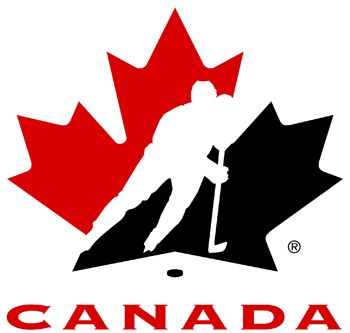
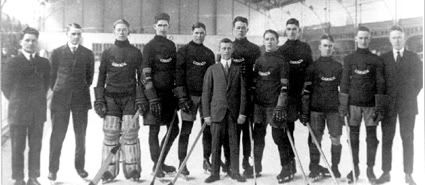
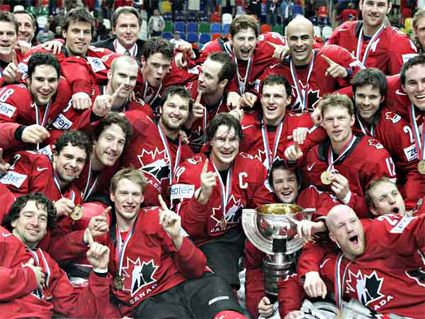
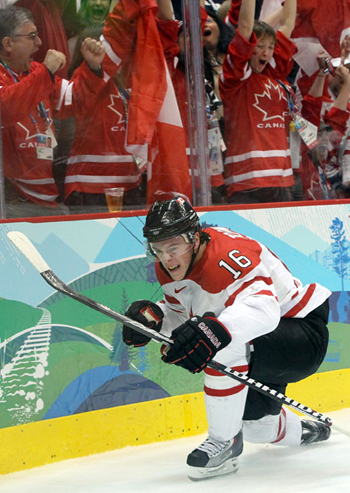
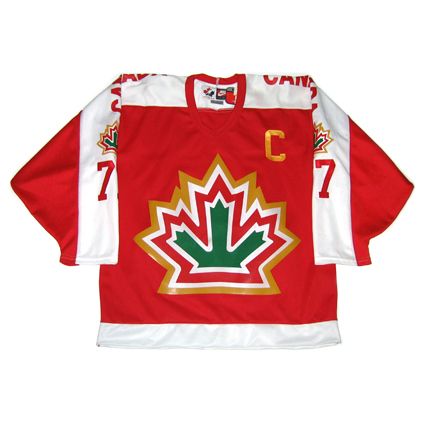
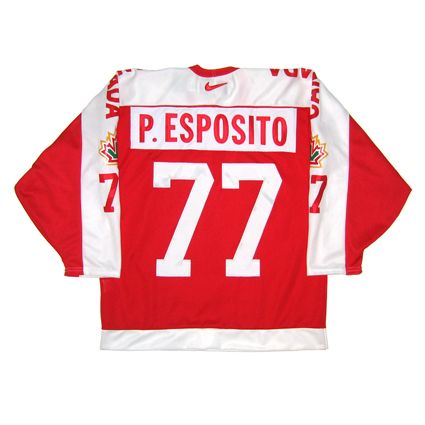











No comments:
Post a Comment
We welcome and encourage genuine comments and corrections from our readers. Please no spam. It will not be approved and never seen.